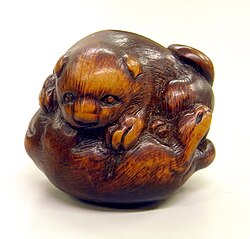netsuke
Appearance
English
[edit]Etymology
[edit]
From Japanese 根付 (netsuke). Literally 根 (ne, “root”) + 付け (tsuke, “attach”).
Pronunciation
[edit]Noun
[edit]netsuke (plural netsukes or netsuke)
- A small, often collectible, artistic carving characterized by an opening or two small holes (紐通し (himotōshi)), most commonly made of wood or ivory, used as a fob at the end of a cord attached to a suspended pouch containing pens, medicines, or tobacco. Netsuke originated in feudal Japan in the late 16th and 17th centuries.
Translations
[edit]miniature sculpture
|
Further reading
[edit] Category:netsuke on Wikimedia Commons.Wikimedia Commons
Category:netsuke on Wikimedia Commons.Wikimedia Commons
Japanese
[edit]Romanization
[edit]netsuke
Portuguese
[edit]Noun
[edit]netsuke m (plural netsukes)
- netsuke (miniature Japanese sculptures)
Categories:
- English terms borrowed from Japanese
- English terms derived from Japanese
- English 3-syllable words
- English 2-syllable words
- English terms with IPA pronunciation
- English lemmas
- English nouns
- English countable nouns
- English nouns with irregular plurals
- English indeclinable nouns
- Japanese non-lemma forms
- Japanese romanizations
- Portuguese lemmas
- Portuguese nouns
- Portuguese countable nouns
- Portuguese terms spelled with K
- Portuguese masculine nouns

